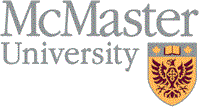
Methods of Applied Math I
 |
Math 741 Methods of Applied Math I FALL 2016 Course Outline |
| Instructor: |
Gail Wolkowicz |
| Office: | Hamilton Hall, Room 318 |
| Office Hours: | by appointment |
| Telephone: | (905) 525-9140, Extension 24808 |
| Email: | |
| Home Page: |
Lecture Times and Location: Wednesday 11:30-1:30
& Friday 9:30-10:30 in HH/312.
Brief Course Description:
The course covers in detail the theory of Ordinary Differential Equations and is very proof intensive, i.e., almost all theorems discussed will be proved and you will also be expected to give proofs on assignments and the take home exam.
Topics selected from: well-posed initial value problems (i. e. existence, uniqueness, continuation and continuous dependence); general non-autonomous linear systems; special linear systems (autonomous, periodic including Floquet theory, the Poincaré map); classical stability theory for nonlinear systems (i. e. Lyapunov functions, linearization, invariance theory, comparison theorems); hyperbolicity and topological congugacies; planar systems including index theory, and Poincaré-Bendixson theory; an introduction to bifurcation theory, centre manifolds, normal forms and use of simulation software such as XPPAUT (downloadable free on the web at: http://www.math.pitt.edu/~bard/xpp/xpp.html.)
Prerequisite: Registration as a graduate student in the Department of Mathematics and Statistics, MATH 3F03, or permission of the instructor. Comfort with real analysis is highly recommended as the course is proof intensive.
Tentative Grading Scheme:
| Component | Weight |
|---|---|
| Assignments | 30% |
| Final Take Home Exam | 70% |
Academic dishonesty consists of misrepresentation by deception or by other fraudulent means and can result in serious consequences, e.g. the grade of zero on an assignment, loss of credit with a notation on the transcript (notation reads: "Grade of F assigned for academic dishonesty"), and/or suspension or expulsion from the university.
It is your responsibility to understand what constitutes academic dishonesty. For information on the various kinds of a academic dishonesty please refer to the Academic Integrity Policy, specifically Appendix 3, located at http://www.mcmaster.ca/policy/Students-AcademicStudies/AcademicIntegrity.pdf
In particular, in this course: